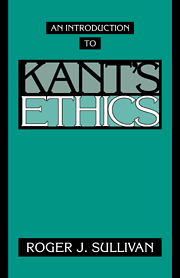Book contents
- Frontmatter
- Contents
- Introduction
- 1 A Beginning: Kant's Political Theory
- 2 The Categorical Imperative: The Ultimate Norm of Morality
- 3 The Formula of Autonomy or of Universal Law
- 4 The Formula of Respect for the Dignity of Persons
- 5 The Formula of Legislation for a Moral Community
- 6 The Limits of the Categorical Imperative
- 7 Morality and Prudence (Foundations 2)
- 8 Moral Character
- 9 Living under the Moral Law
- 10 The Defense of Morality (Foundations 3)
- Suggestions for Further Reading
- Index
5 - The Formula of Legislation for a Moral Community
Published online by Cambridge University Press: 05 November 2009
- Frontmatter
- Contents
- Introduction
- 1 A Beginning: Kant's Political Theory
- 2 The Categorical Imperative: The Ultimate Norm of Morality
- 3 The Formula of Autonomy or of Universal Law
- 4 The Formula of Respect for the Dignity of Persons
- 5 The Formula of Legislation for a Moral Community
- 6 The Limits of the Categorical Imperative
- 7 Morality and Prudence (Foundations 2)
- 8 Moral Character
- 9 Living under the Moral Law
- 10 The Defense of Morality (Foundations 3)
- Suggestions for Further Reading
- Index
Summary
The first formula commands us to act autonomously, on maxims fit to serve as the formal structure of a moral world. The second formula commands us to to recognize that all persons have objective value and so are obligatory “matter.” Kant called the third formula the most comprehensive variation of the Categorical Imperative, combining both the matter and the form of our moral life (431, 436): “Every rational being must act as if by his maxims he were at all times a legislative member of the universal kingdom of ends” (438; see 431, 434).
THE ROLE OF THE THIRD FORMULA
The third formula presents us with a moral vision of our final and comprehensive collective destiny, thereby satisfying our rational need for an ultimate goal. It is our nature as reasoning beings, Kant wrote, to seek ultimate answers. Partial or tentative answers will not do, for we seek explanations that are comprehensive as well as final. He summarized our quest for finalities by asking three questions. The first was, What can I know? and his answer (in his Critique of Pure Reason) was that what we can know is limited to what we can learn through experience, through our senses. The second question was, What ought I to do? and the answer, as we have seen, was, “Fulfill your moral vocation, by adopting and acting on the Law of Autonomy.”
The third question was, If I do what I ought to do, what may I then hope? Kant addressed this question most fully in his Religion within the Limits of Reason Alone.
- Type
- Chapter
- Information
- An Introduction to Kant's Ethics , pp. 84 - 93Publisher: Cambridge University PressPrint publication year: 1994



